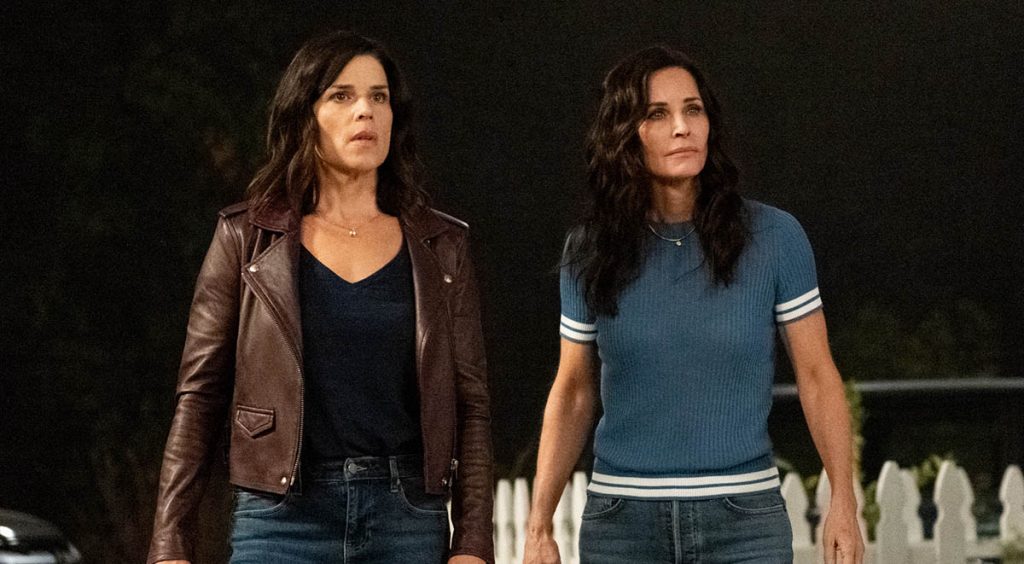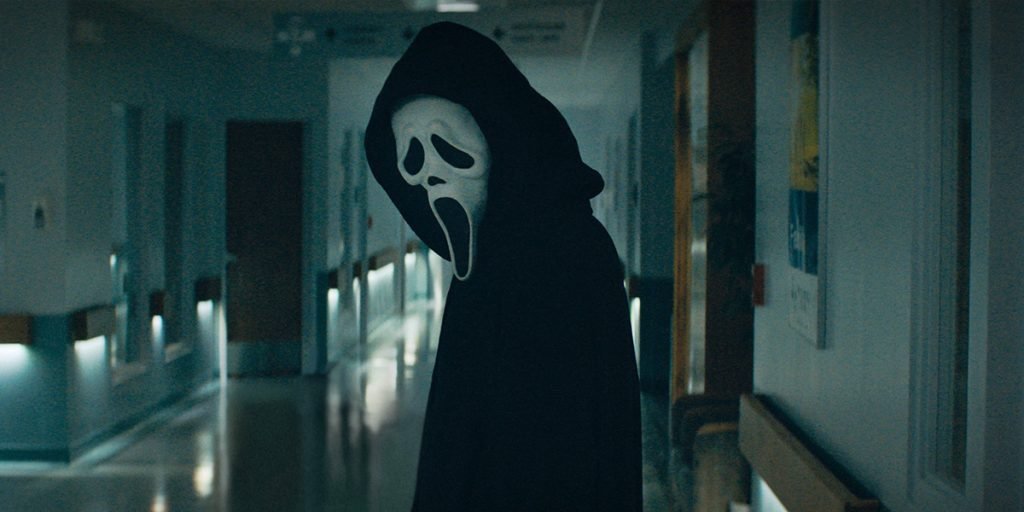Scream (2022) radically reinvigorates the franchise in ferocious fashion, serving up spooky spectacle and masterful meta commentary on modern horror and fandom.
It’s hard to sum up the significance of the first Scream in not just the horror genre, but the film industry as a whole. At a time when slashers had been disregarded by the public due to subpar sequel after subpar sequel (Jason Goes to Hell: The Final Friday, Freddy’s Dead: The Final Nightmare, Halloween: The Curse of Michael Myers – you name it), director Wes Craven and writer Kevin Williamson gave the subgenre a new lease on life with this wonderfully witty and wildly wicked “whodunit,” tearing apart age-old horror tropes (“You can never have sex!” “You can never drink or do drugs!” “You can never say ‘I’ll be right back!’”) and confronting genre clichés head on while simultaneously serving up a scarefest that was still authentically anxiety-inducing in its own right. By populating the picture with protagonists who were savvy to the story beats of scary movies (including ferocious “Final Girl” Sidney Prescott, played by a pitch-perfect Neve Campbell), Scream showed that slasher flicks didn’t have to choose between being spooky or being smart, as the secret to its continued success is the synthesis of these two elements in Williamson’s subversive and scorching screenplay, which never dulled down its wit for the audience.
While many would try to replicate Scream’s signature formula in the years that followed (including some small-scale sensations like Halloween H20: 20 Years Later and some shameful stinkers like Urban Legend), no copycat could come close to the clever and cunning craftiness of Craven and Williamson, and the Scream sequels – yes, even the much-maligned and misunderstood third installment – always stayed one step ahead of the game. However, following the unfortunate financial failure of the fourth film in the franchise in 2011 (an ahead-of-its-time commentary on the menace of social media and Millennial entitlement), the Scream series was put on ice, and when Craven passed away in 2015, it looked like the rumored fifth film would never see the light of day – concerns made all the more credible after the closure of The Weinstein Company (the series’ home) in the wake of the sexual assault allegations against Harvey Weinstein in the fall of 2017. And yet, in November 2019, a savior arrived in the form of Spyglass Media Group, which acquired the rights to make a new Scream sequel and subsequently hired directors Matt Bettinelli-Olpin and Tyler Gillett, of Ready or Not fame, to helm this this hyped horror reboot.
And though Kevin Williamson didn’t return this time around to script this particular Scream sequel – making it only the second film in the franchise he hasn’t written, after Scream 3 – he persisted in overseeing the project as an executive producer, while Zodiac’s James Vanderbilt and Ready or Not’s Guy Busick were tasked with the challenge of making Scream seem “relevant” again in an era where everyone is cashing in on the “meta craze” these days (The Cabin in the Woods, 21 Jump Street, Deadpool, and so on and so forth). But within mere moments, this crew proves why the Scream series has always been a cut above the rest, inventing yet another instantly iconic opening that pays homage to the past while setting up a bright new future for the franchise at the same time and updating its classic devilish dialogue to center around modern trends in horror and cinema in general, feeling as “of the moment” and “ahead of its time” as the original Scream was 26 years ago. The minutiae of the movie’s plot may not be all that revolutionary – a young woman estranged from her family named Sam Carpenter (Melissa Barrera, of In the Heights) has to head home to Woodsboro after her sister Tara (Jenna Ortega, of Netflix’s You and The Fallout) is brutally attacked by a new killer assuming the Ghostface identity and finds that some of her darkest secrets are tied to these latest slayings – but the ultimate reasoning for this franchise resurrection is, proving that Vanderbilt and Busick have the skills to not just make a “scary movie” that’s surface-level satisfying, but one with something to say as well.

Every Scream sequel has tackled some sort of social theme (Scream 2 famously satirized those who blamed violence in cinema for real-life crime in response to pushback against the first film), but this Scream’s social commentary might be the sharpest and most pointed yet, directly dissecting the terrors of today’s toxic fandoms (look no further than the constant chaos that the creators behind DC and Star Wars find themselves embroiled in) with blistering bite. To state what makes this social critique so specifically compelling would cause one to delve into spoilers, so we’ll leave it at this: few in the industry have properly portrayed the psyche of these frenzied fans with such accurate absurdity while never losing sight of the more insidious aspects of their identities as well, so that we concurrently find them both comical and chilling. It’s a tricky tonal tightrope act – especially when risking the ire of the individuals you’re ribbing – but Vanderbilt and Busick pull it off perfectly, succeeding at being some of the first screenwriters to properly probe this daunting subject matter. But, tackling topics few other franchises would and actually managing to make a scathing social statement is a Scream trademark, and these two carry on that tradition in tremendous fashion here.
Also of note in this standout script are Vanderbilt and Busick’s masterfully meta musings on the state of the horror genre and the IP-obsessed film industry today – musings that would make Williamson proud. Beginning with that beautifully orchestrated opening sequence in which the evolution of “elevated horror” is wickedly skewered and continuing throughout the film with riotous observations on audiences’ obsession with “requels” (that peaks with a marvelous mid-movie monologue delivered by Yellowjackets’ Jasmin Savoy Brown’s Mindy Meeks-Martin – niece of the late Randy Meeks – which brilliantly breaks down the derivative formula that all these films build their foundations around with such elaborate explanation that would undeniably thrill her uncle), Scream’s caustic and current commentary allows it to once again assert itself as one of the freshest and most forward-thinking franchises around. And while it too may not be resistant to indulging in some of the signature tropes of these “requels,” it does so with innovation and intelligence, never content to just “roll through the motions” as too many others do. Vanderbilt and Busick make a clear effort to make this “requel” stand apart from the rest and circumvent certain commonplace conventions, and their effort exceeds all expectations. (And how fitting is it that, after Scream 4 arguably kickstarted this “requel”/“legacyquel” trend in 2011, this Scream might be the smartest ever since?).
Wes Craven is a tough act to follow, but Bettinelli-Olpin and Gillett try their damndest to do him justice, and they excel exceptionally here, engineering stunning suspense-driven setpiece after stunning suspense-driven setpiece (The shocking opening slaughter! Horrors in a hospital! Peril at a house party!) that might at first feel familiar to super fans of the franchise but are made modern via the integration of tricky new technology (home security apps, tracking devices, etc.) and given their own sick spin by the directing duo’s fondness for wickedly gnarly gory kills. Savagery and Scream go hand-in-hand, but Bettinelli-Olpin and Gillett still brilliantly amp up the brutality in a way that will surely satisfy those who fancy Ready or Not’s bombastically bloody finale while simultaneously suffusing this Scream story with higher stakes, as Ghostface’s sadistic slayings make it clear that no character is safe – and they have no problem leaving very little of them left, either.
Speaking of that cast of colorful characters, a Scream movie is only as engaging as its ensemble, and, thankfully, a terrific team of newbies has been assembled to carry on the torches going forward in this franchise. Barrera’s Sam may be no Sidney Prescott (who is?), but she’s relatable enough in her role, selling both her deep dedication to her sister and some additional surprises in her character arc that might mess with long-term masters of the Scream mythology but still serve this story well thematically. With that being said however, it’s the supporting cast who steals the show here: Ortega, a star on the rise, continues to solidify her status as her generation’s “Scream Queen” in a thrilling turn; the aforementioned Brown is a side-splitting Randy Meeks surrogate with sass to spare; The Boys’ Jack Quaid is a riot as Sam’s skittish boyfriend Richie; Once Upon a Time in Hollywood’s Mikey Madison makes a major impression as the enigmatic yet alluring Amber; and 13 Reasons Why’s Dylan Minnette quickly earns our affection as the amiable Wes. And, of course, returning fan faves Sidney (Neve Campbell), Gale (Courteney Cox), and Dewey (a delightful David Arquette, who acts as the movie’s MVP), look like they’ve never left, fitting back into this eerie environment effortlessly, with Vanderbilt and Busick actually affording them stirring storylines (specifically when it comes to Gale and Dewey) worthy of their time.
When thinking of all the ways a fifth Scream sequel set over a decade after the fourth film and 25 years after the original could’ve gone wrong, it’s pretty much a miracle that this movie turned out as thrilling and thematically thought-provoking as it did, radically reinvigorating the franchise in ferocious fashion by both serving up some sincerely suspenseful spooky spectacle and contributing masterfully meta commentary to the conversations surrounding modern day horror, financially motivated franchise continuations, and terrifyingly toxic fandoms. It only takes one scene for this Scream to justify its existence (as one of the only “requels” to dare to do something different while still delivering on the requisite nostalgia-driven thrills series devotees come to see) and by the end, it once again makes us realize that this franchise will always be relevant – not just to the ever-evolving horror genre, but to a film industry that’s constantly generating tacky new trends that will always need critiqued, with petrifying but pressingly pointed pictures like these keeping studios, and audiences, on their toes.
Scream (2022) opens in theatres everywhere on Friday, January 14, 2022.

